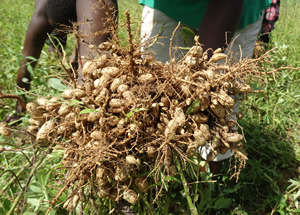
Aflatoxin exposure, namely through infected groundnuts, is hypothesized to be associated with decreased linear growth in children (stunting) through increased infection and suppressing the immune system. However, groundnuts, a common legume in northern Ghana, are an important source of protein and fat in young children’s diets. Groundnuts are typically promoted as a key ingredient in young children’s complementary foods due to their nutritional factors. Therefore, controlling aflatoxin contamination is essential in efforts to control child undernutrition and, more generally, to ensure a safe food supply.
SPRING/Ghana is working with the Ministry of Food and Agriculture’s Agriculture Extension Agents (AEA) through farmer field schools (FFS) to help farmers, especially women who raise groundnuts, to modify a few practices at each stage of groundnut production (planting, growing, harvesting, and storage) to reduce the possibility of aflatoxin contamination and spread. To support the hands-on learning in the FFSs, we produced two radio dramas to reach other farmers and community members about key aflatoxin control practices. The radio dramas depict everyday scenes and conversations and are produced in the 6 local languages spoken in the 15 northern Ghana districts where SPRING works.
Each radio drama is 5 minutes long. The first drama relays information on sources of good seeds for planting, seed selection, characteristics of bad nuts, and safe disposal of likely aflatoxin-contaminated groundnuts, and it offers a call to action by linking farmers to AEAs. The second drama promotes harvesting- and consumption-related behaviors to ensure safe groundnuts for home consumption and to attract a good market price. The radio dramas have been broadcast by 8 radio stations that reach most of the communities in the 15 districts where SPRING works.
To hear the radio dramas, please click on the play button of the player below.